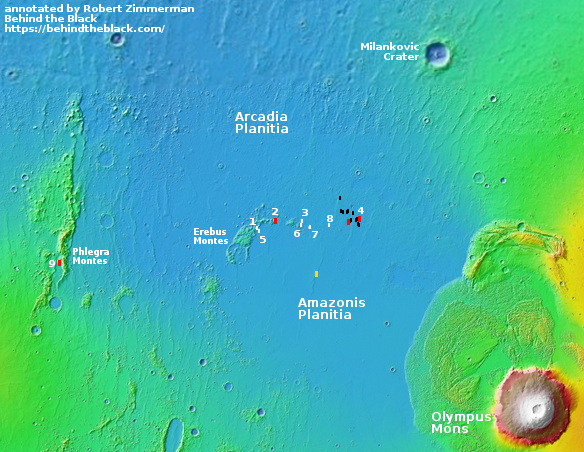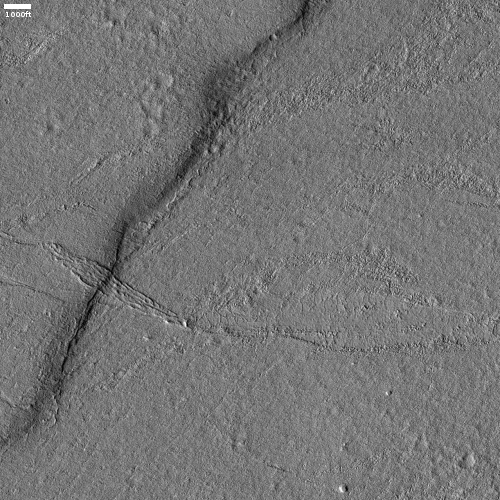A quake south of Starship’s prime landing sites on Mars
Cool image time! The photo to the right, rotated, cropped, and reduced to post here, was taken on February 23, 2022 by the high resolution camera on Mars Reconnaissance Orbiter (MRO). Though it shows the largely featureless northern lowland plains of Mars, it is particularly interesting for two reasons.
First, according to the photo’s label this scarp/ridge is apparently near a quake detected by the seismometer placed on Mars by the lander InSight, located about a thousand miles to the southwest. Though no information of the strength of this quake is available, it is likely to have been a small and weak one, interesting mostly because it indicates some small underground instability or a recent small impact on the surface. The image favors the former, as it shows no obvious recent features of change. What it does show is one very intriguing flow feature draping the scarp. As the location is at 34 north latitude in a region where scientists have found a lot of evidence of water ice very close to the surface, the flow could very well be glacial in nature, though dismissing a lava origin would be a mistake.
The second reason this location is of interest is what lies relatively nearby, as shown in the overview map below.

The photo, marked by the small yellow rectangle in Amazonis Planitia, is only about 100 to 150 miles south of three of the four prime candidate landing sites for SpaceX’s Starship spacecraft.
That a quake was found in this region does not make it unsuitable for a future Starship landing, especially as the quake was likely very weak. Instead, if anything it makes the location — and this scarp/ridgeline — more interesting in terms of research. Why was there a quake here? Does it signify motion in glacial material? An impact? Or some shifting below ground that could provide information about the larger geology of this region?
The scientists who arrive on those early Starship missions are certainly going to consider this location a prime site for exploration and research.
On Christmas Eve 1968 three Americans became the first humans to visit another world. What they did to celebrate was unexpected and profound, and will be remembered throughout all human history. Genesis: the Story of Apollo 8, Robert Zimmerman's classic history of humanity's first journey to another world, tells that story, and it is now available as both an ebook and an audiobook, both with a foreword by Valerie Anders and a new introduction by Robert Zimmerman.
The print edition can be purchased at Amazon or from any other book seller. If you want an autographed copy the price is $60 for the hardback and $45 for the paperback, plus $8 shipping for each. Go here for purchasing details. The ebook is available everywhere for $5.99 (before discount) at amazon, or direct from my ebook publisher, ebookit. If you buy it from ebookit you don't support the big tech companies and the author gets a bigger cut much sooner.
The audiobook is also available at all these vendors, and is also free with a 30-day trial membership to Audible.
"Not simply about one mission, [Genesis] is also the history of America's quest for the moon... Zimmerman has done a masterful job of tying disparate events together into a solid account of one of America's greatest human triumphs."--San Antonio Express-News
Cool image time! The photo to the right, rotated, cropped, and reduced to post here, was taken on February 23, 2022 by the high resolution camera on Mars Reconnaissance Orbiter (MRO). Though it shows the largely featureless northern lowland plains of Mars, it is particularly interesting for two reasons.
First, according to the photo’s label this scarp/ridge is apparently near a quake detected by the seismometer placed on Mars by the lander InSight, located about a thousand miles to the southwest. Though no information of the strength of this quake is available, it is likely to have been a small and weak one, interesting mostly because it indicates some small underground instability or a recent small impact on the surface. The image favors the former, as it shows no obvious recent features of change. What it does show is one very intriguing flow feature draping the scarp. As the location is at 34 north latitude in a region where scientists have found a lot of evidence of water ice very close to the surface, the flow could very well be glacial in nature, though dismissing a lava origin would be a mistake.
The second reason this location is of interest is what lies relatively nearby, as shown in the overview map below.

The photo, marked by the small yellow rectangle in Amazonis Planitia, is only about 100 to 150 miles south of three of the four prime candidate landing sites for SpaceX’s Starship spacecraft.
That a quake was found in this region does not make it unsuitable for a future Starship landing, especially as the quake was likely very weak. Instead, if anything it makes the location — and this scarp/ridgeline — more interesting in terms of research. Why was there a quake here? Does it signify motion in glacial material? An impact? Or some shifting below ground that could provide information about the larger geology of this region?
The scientists who arrive on those early Starship missions are certainly going to consider this location a prime site for exploration and research.
On Christmas Eve 1968 three Americans became the first humans to visit another world. What they did to celebrate was unexpected and profound, and will be remembered throughout all human history. Genesis: the Story of Apollo 8, Robert Zimmerman's classic history of humanity's first journey to another world, tells that story, and it is now available as both an ebook and an audiobook, both with a foreword by Valerie Anders and a new introduction by Robert Zimmerman.
The print edition can be purchased at Amazon or from any other book seller. If you want an autographed copy the price is $60 for the hardback and $45 for the paperback, plus $8 shipping for each. Go here for purchasing details. The ebook is available everywhere for $5.99 (before discount) at amazon, or direct from my ebook publisher, ebookit. If you buy it from ebookit you don't support the big tech companies and the author gets a bigger cut much sooner.
The audiobook is also available at all these vendors, and is also free with a 30-day trial membership to Audible.
"Not simply about one mission, [Genesis] is also the history of America's quest for the moon... Zimmerman has done a masterful job of tying disparate events together into a solid account of one of America's greatest human triumphs."--San Antonio Express-News



Its Mars Quake not a Earthquake